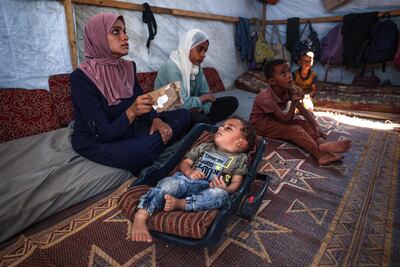Live updates: Follow the latest from Israel-Gaza
In a hot, cramped, plastic tent in central Gaza, Nevin Abu Al Jidyan fans the youngest of her nine children with a piece of cardboard as he lies asleep in a bassinet, unable to move after being infected with polio.
Just 11 months old, Abdul Rahman is too young to be aware that he made history with Gaza’s first case of polio since the disease was declared eradicated in the occupied Palestinian territories 25 years ago.
“He used to move,” his mother said as she showed The National a video of her son crawling.
The poliovirus has re-emerged in Gaza after more than 10 months of an Israeli military assault that has destroyed much of the enclave, including its healthcare and sanitation facilities, and displaced most of the population. Untreated sewage, piles of rubbish and severe overcrowding in the limited areas considered safe, with about 30,000 people per square kilometre, has created conditions for disease to spread rapidly.
Six out of seven samples taken from sewage water in the Gaza Strip’s central and southern areas tested positive for polio, according to Khalil Al Daqran, spokesman for Al Aqsa Martyrs Hospital in the central city of Deir Al Balah.
The fear now is that more children will become infected.
“Two months ago, Abdul Rahman got a fever and began vomiting and stopped moving,” his mother said.
The family took him to Al Aqsa Martyrs Hospital, where tests were done and samples taken and sent to Jordan for analysis.
“Two weeks later, I got a call saying my son had polio,” she said

“It was a shock. I had many questions. How, from who, where did it come from?”
Being as old as Israel's war in Gaza which has killed more than 40,400 people and wounded 93,647 others, Abdul Rahman has not had access to proper medical care since birth.
“They told me the main reason for his illness is because he didn’t receive his vaccines,” his mother said. “Our constant displacement has made that impossible.”
The UN said nine out of 10 Gazans have been displaced by the war, with many living in Israeli-designated “humanitarian zones” that are shrinking as the military issue new eviction orders, like the one in Al Mawasi.
The UN said it and other aid agencies are incapable of carrying out their duties because some of the facilities containing proper water and assistance are now in areas that Israel has deemed “combat zones”.
Ms Abu Jidyan says there was only so much she can do to make sure her temporary home and the area around it are clean.
“How can you clean sand? Or the sewage that’s outside? The mosquitoes bite the boy all day long. The food is unhealthy, the water unhealthy.”
A polio vaccination campaign that is scheduled to begin on August 31 is intended to inoculate 640,000 children but this may be a tall order in Gaza, where several humanitarian groups have described the situation as “unprecedented”.
Abdul Rahman’s mother is not hopeful that her son will get the treatment he needs.
“He needs physiotherapy for his legs, he needs medicine and special care. We don’t have that here. He needs to travel abroad.”
